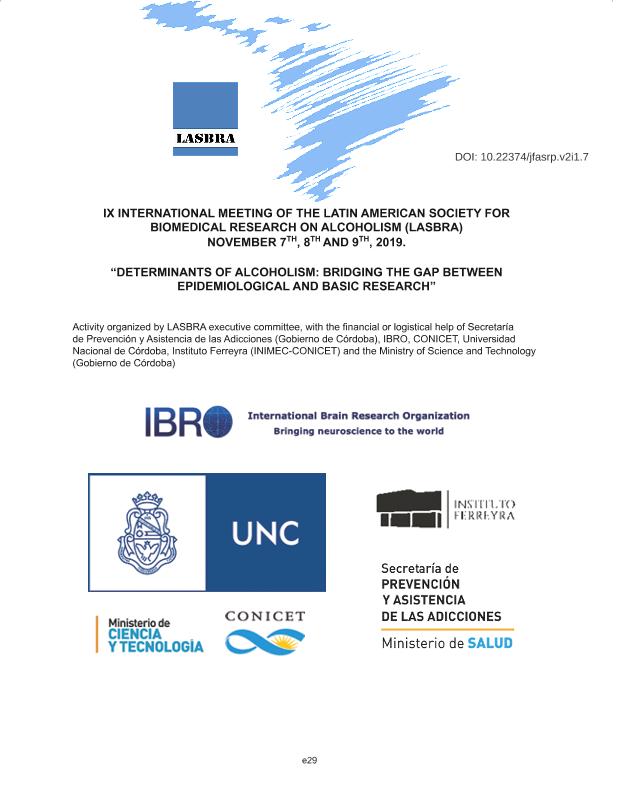Mostrar el registro sencillo del ítem
dc.contributor.author
Salguero, Juan Agustín

dc.contributor.author
Méndez, Santiago
dc.contributor.author
Abate, Paula

dc.contributor.author
Balaszczuk, Veronica

dc.date.available
2022-07-21T00:09:20Z
dc.date.issued
2019
dc.identifier.citation
Omega-3 but not Omega 6 mitigates Behavioral Impairments Induced by Binge Ethanol Exposure in Rat Neonates; IX International Meeting of the Latin American Society for Biomedical Research on Alcoholism (LASBRA): Determinants of Alcoholism: bridging the gap between epidemiological and basic research; Córdoba; Argentina; 2019; e63-e64
dc.identifier.uri
http://hdl.handle.net/11336/162692
dc.description.abstract
Maternal alcohol consumption during pregnancy may cause neurocognitive and behavioral disorders that canpersist until adulthood. Epidemiological data has revealed an alarming increase in the frequency of alcoholintake in pregnant women. Nutritional variables may also have an impact on the behavioral alterations occasioned by alcohol during development. Moreover, omega-3, a polyunsaturated fatty acid necessary fornormal brain development, is deficient in ethanol-treated animals. Although studies have shown that omega-3supplementation after prenatal ethanol (EtOH) treatment improves some disorders, there are no reports aboutacute treatment with omega-3 in binge alcohol neurotoxic models during postnatal development. The goalof this study was to determine whether an administration of omega-3, after an acute ethanol dose in neonates, would be able to attenuate alcohol effects in offspring. Male/ female rats were administered ethanol(2.5 g/kg s.c. at 0 and 2 h) or saline on postnatal day (PND) 7, with a single dose of omega-3 (720 mg/kg),or omega-6, 15 min after the last alcohol injection. It has been found that EtOH-treated animals showedhyperlocomotion and anxiety-like behavior on PND 14. Administration of omega-3 after EtOH treatmentreduced hyperlocomotion and the anxiety-like behaviors on PND 14. On the other hand, animals treated withomega-6 did not reduce those EtOH effects. In conclusion, acute ethanol exposure induced neurobehavioral alterations that persisted in the offspring and omega 3 mitigates those effects but not omega 6. These dataare relevant considering that omega-3 treatment may have therapeutic effects through mitigating some ofethanol´s damaging consequences.
dc.format
application/pdf
dc.language.iso
eng
dc.publisher
Dougmar Publishing Group
dc.rights
info:eu-repo/semantics/openAccess
dc.rights.uri
https://creativecommons.org/licenses/by-nc/2.5/ar/
dc.subject
OMEGA-3
dc.subject
ETHANOL
dc.subject
PRENATAL EXPOSURE
dc.subject
INFANT RATS
dc.subject.classification
Otras Psicología

dc.subject.classification
Psicología

dc.subject.classification
CIENCIAS SOCIALES

dc.title
Omega-3 but not Omega 6 mitigates Behavioral Impairments Induced by Binge Ethanol Exposure in Rat Neonates
dc.type
info:eu-repo/semantics/publishedVersion
dc.type
info:eu-repo/semantics/conferenceObject
dc.type
info:ar-repo/semantics/documento de conferencia
dc.date.updated
2022-07-19T15:46:20Z
dc.journal.volume
2
dc.journal.number
1
dc.journal.pagination
e63-e64
dc.journal.pais
Estados Unidos

dc.journal.ciudad
Dundas
dc.description.fil
Fil: Salguero, Juan Agustín. Universidad Nacional de Córdoba. Facultad de Psicología; Argentina. Universidad Nacional de Córdoba. Instituto de Investigaciones Psicológicas. - Consejo Nacional de Investigaciones Científicas y Técnicas. Centro Científico Tecnológico Conicet - Córdoba. Instituto de Investigaciones Psicológicas; Argentina
dc.description.fil
Fil: Méndez, Santiago. Universidad Nacional de Córdoba. Facultad de Psicología; Argentina
dc.description.fil
Fil: Abate, Paula. Universidad Nacional de Córdoba. Instituto de Investigaciones Psicológicas. - Consejo Nacional de Investigaciones Científicas y Técnicas. Centro Científico Tecnológico Conicet - Córdoba. Instituto de Investigaciones Psicológicas; Argentina. Universidad Nacional de Córdoba. Facultad de Psicología; Argentina
dc.description.fil
Fil: Balaszczuk, Veronica. Universidad Nacional de Córdoba. Instituto de Investigaciones Psicológicas. - Consejo Nacional de Investigaciones Científicas y Técnicas. Centro Científico Tecnológico Conicet - Córdoba. Instituto de Investigaciones Psicológicas; Argentina. Universidad Nacional de Córdoba. Facultad de Psicología; Argentina
dc.relation.alternativeid
info:eu-repo/semantics/altIdentifier/url/https://www.jfasrp.com/index.php/JFASRP/article/view/7
dc.relation.alternativeid
info:eu-repo/semantics/altIdentifier/doi/http://dx.doi.org/10.22374/jfasrp.v2i1.7
dc.conicet.rol
Autor

dc.conicet.rol
Autor

dc.conicet.rol
Autor

dc.conicet.rol
Autor

dc.coverage
Internacional
dc.type.subtype
Reunión
dc.description.nombreEvento
IX International Meeting of the Latin American Society for Biomedical Research on Alcoholism (LASBRA): Determinants of Alcoholism: bridging the gap between epidemiological and basic research
dc.date.evento
2019-11-07
dc.description.ciudadEvento
Córdoba
dc.description.paisEvento
Argentina

dc.type.publicacion
Journal
dc.description.institucionOrganizadora
Latin American Society for Biomedical Research on Alcoholism
dc.source.revista
Journal of Fetal Alcohol Spectrum Disorder
dc.date.eventoHasta
2019-11-09
dc.type
Reunión
Archivos asociados
